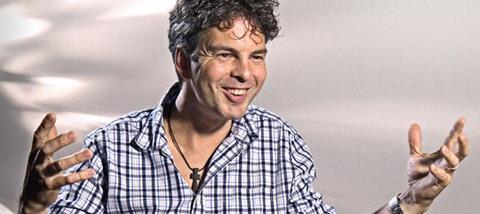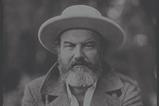“We weren’t trying to start a movement. I just got hungry for God”. In 1999 Pete Greig received a vision from God. Fourteen years on, 24-7 Prayer has become an international movement with countless stories of God breaking in across the world. We meets its leader.

'God sneezed.’ That’s the theological definition Pete Greig gives to the day that 24-7 Prayer was birthed in 1999. From there he says ‘it just went viral’ (always a danger with sneezing). From Kansas to Ibiza, Christians started praying in 24-hour ‘boiler rooms’ ? spaces set aside for a constant vigil of prayer, day and night. Fourteen years on, the ‘nonstop prayer meeting’ is continuing in more than 100 nations, most recently in Hong Kong.
Greig has a happy-go-lucky charisma about him. I’m not surprised when he tells me that he’s a surfer ? with his mop of tousled hair and dress-down style, he looks the part ? and more than once he talks about ‘riding the wave’ of the 24-7 movement, a story related in his first book, Red Moon Rising (Kingsway). It’s a vast project with many associated ministries, but I get the feeling Greig remains more interested in relationships than management. He loves telling stories about people.
There are the atheists who showed up in a prayer room and said they could feel God’s presence. The teenage girls who danced to ABBA and sang their prayers out loud. The 3,000 people who turned up in Chichester to pray for the new Archbishop of Canterbury. Greig’s eyes sparkle when he tells those stories. Maybe spending a lot of time investing in a relationship with Godteaches you a thing or two about the human ones too.
The recent 24-7 international gathering in Dublin was more about community spirit than corporate strategy. Everyone had a story to tell. And though Greig is the leader of a global organisation, he spent very little time on stage himself. This grass roots movement is full of ordinary people through whom God is doing amazing things. As the organisation grows and spreads around the world, one of the challenges is to keep its original relational approach.
A new video-based prayer course aimed at small groups has recently been launched, but the ethos remains the same ? it’s entirely online and free. ‘There’s no agenda, we just want to help the Church pray,’ says its founder.
Paralleling all the stories of answered prayer has been an intense personal struggle for Greig. In 2001, shortly after the birth of their second child, his wife, Sammy, suffered a series of seizures brought on by a massive brain tumour. And prayer didn’t make it go away. It provoked a crisis of faith in Greig ? who was publicly leading a global prayer ministry, while privately questioning whether God existed at all.
More than ten years on, the seizures and the cancer are still present, but under control. It’s led to Greig accepting that we won’talways see the answers we want. ‘I don’t think God always gets his way,’ he says, ‘ultimately yes, but in the short term there is a genuine battle.’
Did you grow up in a Christian family?
Yes. One of my earliest memories is seeing my father kneeling by his bedside, praying, and wondering what he was saying. Those things go deep. Then I quit my faith when I was 17. A whole bunch of things had gone wrong in my life at the same time, and I think I felt there was a gap between my experience of Church and what I read in the Bible.
Discipleship lives with the paradox of miracles on the one hand, and un-miracles on the other. Even when it tears you apart, it’s still somehow in that space that you grow into maturity in your relationship with God
I rediscovered my faith working with Jackie Pullinger in Hong Kong, and that was a totally transformational experience. I’d heard that miracles were happening and the blind were seeing. I thought, ‘I’ll go and find out how to do revival, then I’ll bring it back’. (Because I’m annoying like that). What actually happened was that I found myself surrounded by people who were so much more like Jesus than me that I was embarrassed to be me. I was embarrassed by the things that made me laugh, I wasembarrassed by my motivation, by the things I was thinking. By the end of my time there I was spending my one day off a week in a tin hut in Kowloon, praying over and over again, ‘Please change my heart or take me home.’
You became involved in church planting back in the UK. Where did the 24-7 movement start?
In the summer of 1999, I became increasingly frustrated. ‘Spiritual hunger’ can sound terribly...spiritual, but actually you just feel nasty. ‘As the deer pants for the streams of living water, so my soul longs after you.’ We put these things to nice Disney tunes, but it should be screaming blues. This is a deer dying of thirst, and it’s about to become a carcass with vultures picking overthe bones if it doesn’t get water. And sometimes your hunger for God can feel like that.
I just got hungry for God. We ended up in Herrnhut in Germany one day, where the Moravians prayed non-stop, and that was where I thought: ‘We should do this’. We weren’t trying to get in the Guinness Book of Records. We weren’t trying to start a movement. We were just a local church, realising we were bad at prayer, and we needed to get better at it.
We started the first prayer room on 5th September 1999. It’s the same day Mike Bickle started the International House of Prayer in Kansas City. Then a number of other global initiatives started just a few weeks after. God sneezed on that date. There was something bigger than any personality and any brand. We are all riding a wave, we are not making the wave.
What happens in a 24-7 Prayer ‘boiler room’
Practically, you just divide a day into hours, and people sign up for an hour or two, or some for half-nights of prayer. Jesus often did half-nights or full-nights of prayer, and so if we’re going to be his followers, we need to do that sometimes. When 1.4 billion Muslims pray five times a day, it isn’t really outrageous to ask Christians to pray for an hour a day, for a week.
Prayer is easier in a prayer room. Time goes more quickly. One of the keys to that is creativity. I don’t see how you can limit prayer to mere words ? so people pray with graffiti, with all types of music, with dance, with all sorts of innovation.
Do you wish the Church was more creative with prayer?
We need to put the kind of imagination and innovation into prayer that we have put into worship, because prayer is talked about more than musical worship in the Bible. We put massive resources, PA systems, songwriters, a whole industry, around worship. And prayer is still a bunch of people on plastic chairs on Thursday night in the church hall ? and we wonder why people find it boring.
What is the effect on people who take part in 24-7 Prayer?
I always remember these two atheists coming into the prayer room and saying, ‘Wow, you can really feel God in here!’ (We had a lot of people who invited friends.) So I said, ‘Yes, but you don’t believe in him.’ They said, ‘No, we don’t, but you can feel him.’ All the surveys tell us that most of your friends and neighbours actually pray regularly. They believe in the power of prayer. And so prayer is actually one of the great paradigms for mission in our time. It isn’t just a battery to make mission happen ?prayer can actually be the place of encounter and connection.
What are some of the different ways that different people choose to pray in a ‘boiler room’
I remember one time I was in the corner of the prayer room, and Nick Hague came in ? an amazing guy who’s now a vicar. He’s the sort of guy who can pray silently. He just knelt down and prayed for an hour. And at the end he stood up, cleared his throat and went on his way. To me it’s a Yoda-like power and I’m in awe of that kind of ability to pray, because I’m an external processor.
Then a bunch of student girls 30 came in to pray. They looked like they were dressed for a night on the town. It was such a clash with the other guy, and I thought, ‘This is going to be interesting because they haven’t seen me.’ My secret fear is that no one’s actually praying in the prayer room, and they went to the stereo and confirmed my worst fears. They put on ABBA....ABBA! They started to dance around to Super Trouper. I was just about to bust them when to my shock and horror,they start praying! They’re going, ‘Jesus, we just thank you (Su-per, Trou-per)!’, and they’re dancing around their handbags.
I sort of said to God, ‘Is this ok?’ And I think God said to me, ‘I’m quite enjoying it’. The reason the Bible says ‘sing unto me a new song’, is that you get so bored of Tim Hughes. We need to pray the way God made us.
You’ve recently launched the Prayer Course. What’s involved?
The aim is to teach people to pray. Jesus’ disciples never asked him to help them preach, or even necessarily to evangelise. They said, ‘Lord, teach us to pray’ ? because they could see that Christ’s prayer life was where everything else came from; his power, his perspective, and all the rest. In response he gave them the Lord’s Prayer, the most famous prayer in the world.
The former Archbishop of Canterbury said, ‘If I had to reduce the whole of Christianity to the back of an envelope, I’d just write the Lord’s Prayer.’ So the Prayer Course is an interactive six-week journey through the Lord’s Prayer. It’s really working well because I think this is what the Holy Spirit longs to do ? turn his Church into a house of prayer for the nations.
CS Lewis said that prayer changed him, not God. Do you think prayer has an effect on God?
This is controversial but I’ll say it nonetheless… If you have a hyper-Calvinist view that it’s all set out in advance, then I don’t think you’ll really pray. It’s pointless. Some dutiful people will do it because God said it, but most won’t. Equally, if you’re hyper-Armenian (the free will view), you’ll burn out doing, doing, doing, because you think it’s all on you and you don’t realise it’s all on God.
So, how do we pray like it all depends on God, and live like it all depends on us? I always tell people when I’m leading prayer meetings that there are things that will happen, that would not happen if we weren’t praying now.
But sometimes things don’t happen. You’ve struggled with disappointment in prayer, haven’t you?
It was a year or two into the start of 24-7, probably at a stage where we thought we were about to conquer the world. My inbox was continually full of answers to prayer. At three in the morning Sammy [my wife] woke me and said, ‘I can’t move my leg.’ I then watched her slip into an epileptic seizure. It’s a horrible thing when the face that you love more than any other looks demonised. I thought I was watching her die.
I remember how hard I had to concentrate to press 999 on my phone. We found out that she had a brain tumour the size of an orange, and when your child is seven weeks old, everything in you screams, ‘This is wrong.’
They were able to get most of it out. We’re now ten years in and it’s not growing back, but the injury created these horrible seizures. Watching Sammy slip into these fits again and again, I would pray for God to make it stop, and most of the time it just didn’t work.
And that led to serious doubts about God?
So here I am, the leader of a global prayer movement, invited to go and speak at all the biggest conferences in the world, and I’m having to stay home to change nappies and be primary carer, because my prayers for my wife aren’t working. I realisedmy prayers that I used to think could save the world didn’t even seem to be able to save my wife.
Sammy’s got a much more wonderful faith than me, really. I would often say, ‘Well, maybe there isn’t a God, because why hasn’t he stopped this seizure?’ And Sammy’s line was brilliant, she said: ‘Pete, getting rid of God right now doesn’t help.’
I think discipleship lives with the paradox of miracles on the one hand, and un-miracles on the other, and even when it tears you apart, it’s still somehow in that space that you grow into maturity in your relationship with God. Suffering comes to all of us, but for me, it’s amazing seeing how God has used that to make me better able to minister to many other people.
Any advice for those who want to start praying, or want to pray better?
Keep it simple. Don’t try and pray your way to the top of the staircase ? pray the next step. Keep it real, especially if you’re the one suffering. God can handle anger. He can handle honesty. The Bible is more honest than most churches.
And then, keep it up ? Jesus explicitly says you’re going to have to persevere in prayer. Sometimes prayer is like stacking dominos, and you pray the same prayer that you’ve prayed 1,000 times before and the whole lot comes through, and it wasjust that you didn’t give up too soon. So keep it simple, keep it real, and keep it up.






































